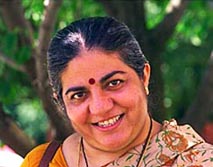
Vandana Shiva: Everything I Need to Know I Learned in the Forest
My ecological journey started in the forests of the Himalaya. My father was a forest conservator, and my mother became a farmer after fleeing the tragic partition of India and Pakistan. It is from the Himalayan forests and ecosystems that I learned most of what I know about ecology.

Vandana Shiva: Giant Walmart vs. the Small Farmer
Source: The Asian Age
India is a land of small farmers. According to the United Nations, the smaller the farm, the higher the productivity.
Small farms grow biodiversity. They are falsely described as unproductive because productivity in agriculture has been manipulated to exclude diversity and exclude costs of high chemical and capital inputs in chemical industrial agriculture. When biodiversity is taken into account, small farms produce more food and higher incomes.
In the heated debate on FDI in retail, those promoting it repeatedly claim that the entry of corporations like Walmart will benefit the Indian farmer. Reference is made to getting rid of the middleman.

Vandana Shiva: Myths About Industrial Agriculture
Source: Al Jazeera
Reports trying to create doubts about organic agriculture are suddenly flooding the media. There are two reasons for this. Firstly, people are fed up of the corporate assault of toxics and GMOs. Secondly, people are turning to organic agriculture and organic food as a way to end the toxic war against the earth and our bodies.
At a time when industry has set its eyes on the super profits to be harvested from seed monopolies through patented seeds and seeds engineered with toxic genes and genes for making crops resistant to herbicides, people are seeking food freedom through organic, non-industrial food.

Vandana Shiva: Our Hunger Games
Source: The Asian Age
Hunger and malnutrition are man-made. They are hardwired in the design of the industrial, chemical model of agriculture. But just as hunger is created by design, healthy and nutritious food for all can also be designed, through food democracy.
We are repeatedly told that we will starve without chemical fertilisers. However, chemical fertilisers, which are essentially poison, undermine food security by destroying the fertility of soil by killing the biodiversity of soil organisms, friendly insects that control pests and pollinators like bees and butterflies necessary for plant reproduction and food production.

20 years after the Earth Summit: What does the future hold?
None of us are immune to climate change, or the effects it will have on the earth and our environment.
In June 2012, movements and leaders will meet in Rio for Rio+20, two decades after the Earth Summit was organised in 1992 to address urgent ecological challenges such as species extinction, biodiversity erosion and climate change. The Earth Summit gave us two very significant international environmental laws: the United Nations Convention on Biological Diversity and the United Nations framework Convention on Climate Change. It also gave us the Rio principles, including the Precautionary Principle and the Polluter Pays Principle.

Beyond fossilised paradigms: Futureconomics of food
Source: Al Jazeera
The economics of the future is based on people and biodiversity – not fossil fuels, toxic chemicals and monocultures.
New Delhi, India – The economic crisis, the ecological crisis and the food crisis are a reflection of an outmoded and fossilised economic paradigm – a paradigm that grew out of mobilising resources for the war by creating the category of economic “growth” and is rooted in the age of oil and fossil fuels. It is fossilised both because it is obsolete, and because it is a product of the age of fossil fuels. We need to move beyond this fossilised paradigm if we are to address the economic and ecological crisis.
